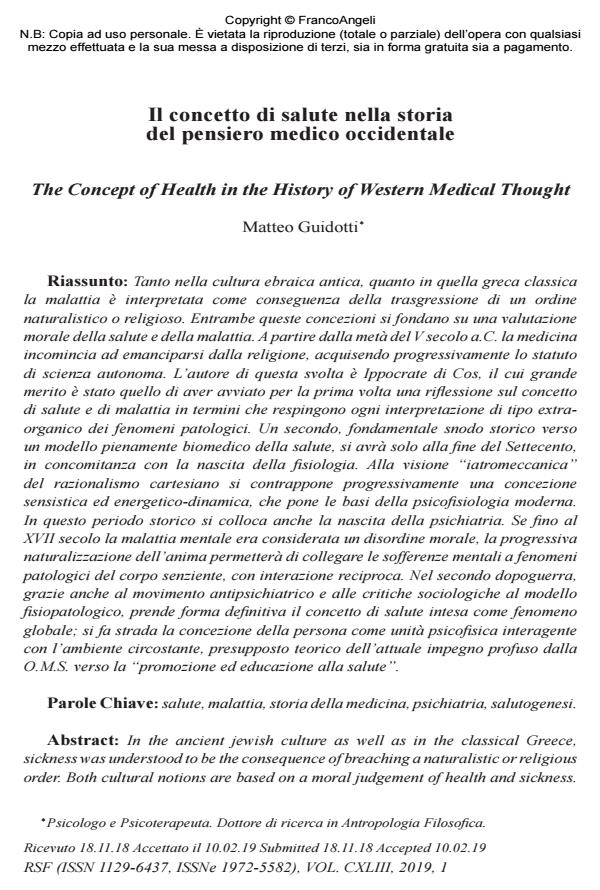The Concept of Health in the History of Western Medical Thought
Journal title RIVISTA SPERIMENTALE DI FRENIATRIA
Author/s Matteo Guidotti
Publishing Year 2019 Issue 2019/1
Language Italian Pages 21 P. 13-33 File size 1822 KB
DOI 10.3280/RSF2019-001002
DOI is like a bar code for intellectual property: to have more infomation
click here
Below, you can see the article first page
If you want to buy this article in PDF format, you can do it, following the instructions to buy download credits

FrancoAngeli is member of Publishers International Linking Association, Inc (PILA), a not-for-profit association which run the CrossRef service enabling links to and from online scholarly content.
In the ancient jewish culture as well as in the classical Greece, sickness was understood to be the consequence of breaching a naturalistic or religious order. Both cultural notions are based on a moral judgement of health and sickness Starting from the second half of the fifth century B.C., medical science began to free itself from religious influence, progressively acquiring a more important role as an autonomous science. Hippocrates of Cos is the promoter of this change; he is credited with starting an in-depth discussion about the concepts of health and sickness, rejecting any extra-organic interpretation of pathological phenomena. It’s only towards the end of the eighteenth century that a second historical turning-point takes place when, together with the birth of physiology, the idea of health becomes fully biomedical. A sensationalist and energetic-dynamic conception of health gradually substitutes the previously "iatro-mechanical" point of view of Cartesian rationalism: this lays the foundation for the modern psychophysiology. This period in history also sees the birth of psychiatry. If up to the XVII century A.D. mental illness was believed to be a moral disorder, the subsequent progressive naturalization of the soul notion led to make a connection between mental diseases and the pathological phenomena of sentient body, allowing for the possibility of a mutual interaction. The idea of health as a global phenomenon takes a more definite shape after the Second World War, thanks even to the antipsychiatric movement and sociological critiques to the physiopathological model. The concept of man as a psychophysical unit, which interacts with the surrounding environment, moves forward and becomes the theoretical basis for the current efforts promoted by WHO towards "promoting and teaching health".
Keywords: Health, sickness, history of medicine, psychiatry, salutogenesis
Matteo Guidotti, Il concetto di salute nella storia del pensiero medico occidentale in "RIVISTA SPERIMENTALE DI FRENIATRIA" 1/2019, pp 13-33, DOI: 10.3280/RSF2019-001002